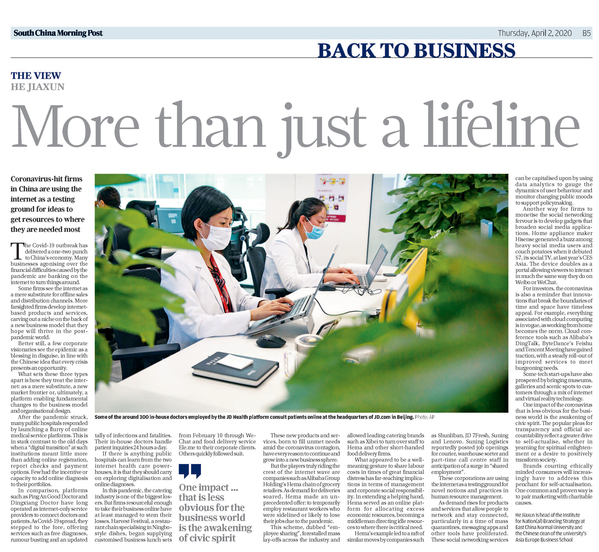He Jiaxun is Professor of Marketing, Deputy Director of the Faculty of Economics and Management, and Chinese Dean of Asia Europe Business School at ECNU. He is also the founder and director of ECNU's Institute for Nation(al) Branding Strategy. His research focuses are branding strategy and global branding, marketing strategy and customer management.

On April 2, he published an article about the coronavirus-hit firms in China in South China Morning Post.

More than just a lifeline
Coronavirus-hit firms in China are using the internet as a testing ground for ideas to get resources to where they are needed most.
The Covid-19 outbreak has delivered a one-two punch to China’s economy. Many businesses agonising over the financial difficulties caused by the pandemic are banking on the internet to turn things around.
Some firms see the internet as a mere substitute for offline sales and distribution channels. More farsighted firms develop internet based products and services, carving out a niche on the back of a new business model that they hope will thrive in the post pandemic world.
Better still, a few corporate visionaries see the epidemic as a blessing in disguise, in line with the Chinese idea that every crisis presents an opportunity.
What sets these three types apart is how they treat the internet: as a mere substitute, a new market frontier or, ultimately, a platform enabling fundamental changes to the business model and organisational design.
After the pandemic struck, many public hospitals responded by launching a flurry of online medical service platforms. This is in stark contrast to the old days when a “digital transition” at such institutions meant little more than adding online registration, report checks and payment options. Few had the incentive or capacity to add online diagnosis to their portfolios.
In comparison, platforms such as Ping An Good Doctor and Dingxiang Doctor have long operated as internet-only service providers to connect doctors and patients. As Covid-19 spread, they stepped to the fore, offering services such as free diagnoses, rumour busting and an updated tally of infections and fatalities.Their in-house doctors handle patient inquiries 24 hours a day.
If there is anything public hospitals can learn from the two internet health care powerhouses, it is that they should carry on exploring digitalisation and online diagnoses.
In this pandemic, the catering industry is one of the biggest losers. But firms resourceful enough to take their business online have at least managed to stem their losses. Harvest Festival, a restaurant chain specialising in Ningbostyle dishes, began supplying customised business lunch sets from February 10 through WeChat and food delivery service Ele.me to their corporate clients. Others quickly followed suit.
One impact ...that is less obvious for the business world is the awakening of civic spirit.
These new products and services, born to fill unmet needs amid the coronavirus contagion, have every reason to continue and grow into a new business sphere.
But the players truly riding the crest of the internet wave are companies such as Alibaba Group Holding’s Hema chain of grocery retailers. As demand for deliveries soared, Hema made an unprecedented offer: to temporarily employ restaurant workers who were sidelined or likely to lose their jobs due to the pandemic.
This scheme, dubbed “employee sharing”, forestalled mass lay-offs across the industry and allowed leading catering brands such as Xibei to turn over staff to Hema and other short-handed food delivery firms.
What appeared to be a well-meaning gesture to share labour costs in times of great financial distress has far-reaching implications in terms of management and corporate social responsibility. In extending a helping hand, Hema served as an online platform for allocating excess economic resources, becoming a middleman directing idle resources to where there is critical need.
Hema’s example led to a raft of similar moves by companies such as Shunliban, JD7Fresh, Suning and Lenovo. Suning Logistics reportedly posted job openings for courier, warehouse sorter and part-time call centre staff in anticipation of a surge in “shared employment”.
These corporations are using the internet as a testing ground for novel notions and practices in human resource management.
As demand rises for products and services that allow people to network and stay connected, particularly in a time of mass quarantines, messaging apps and other tools have proliferated. These social networking services can be capitalised upon by using data analytics to gauge the dynamics of user behaviour and monitor changing public moods to support policymaking.
Another way for firms to monetise the social networking fervour is to develop gadgets that broaden social media applications. Home appliance maker Hisense generated a buzz among heavy social media users and couch potatoes when it debuted S7, its social TV, at last year’s CES Asia. The device doubles as a portal allowing viewers to interact in much the same way they do on Weibo or WeChat.
For investors, the coronavirus is also a reminder that innovations that break the boundaries of time and space have timeless appeal. For example, everything associated with cloud computing is in vogue, as working from home becomes the norm. Cloud conference tools such as Alibaba’s DingTalk, ByteDance’s Feishu and Tencent Meeting have gained traction, with a steady roll-out of improved services to meet burgeoning needs.
Some tech start-ups have also prospered by bringing museums, galleries and scenic spots to customers through a mix of internet and virtual reality technology.
One impact of the coronavirus that is less obvious for the business world is the awakening of civic spirit. The popular pleas for transparency and official accountability reflect a greater drive to self-actualise, whether in yearning for spiritual enlightenment or a desire to positively transform society.
Brands courting ethically minded consumers will increasingly have to address this penchant for self-actualisation. One common and proven way is to pair marketing with charitable causes.
Author: He Jiaxun
Source: South China Morning Post




